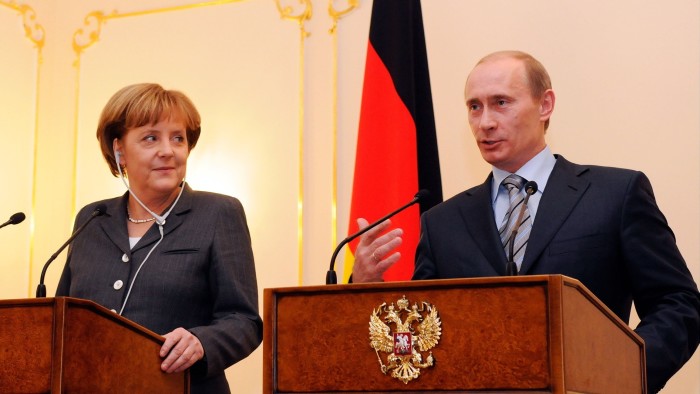Unlock the Editor’s Digest for free
Roula Khalaf, Editor of the FT, selects her favourite stories in this weekly newsletter.
Angela Merkel has defended her refusal to offer Ukraine a path to Nato membership in 2008, saying it would have been “playing with fire” to ignore Russia’s opposition to Kyiv joining the military alliance.
The argument is contained in Freedom: Memoirs 1954-2021, the four-time German chancellor’s much-anticipated memoirs, excerpts of which were published in the weekly newspaper Die Zeit on Wednesday.
Merkel has faced fierce criticism since Russia’s full-scale invasion of Ukraine in February 2022 over her foreign policy in the years before the war, with some of her detractors accusing her of cosying up to Russian President Vladimir Putin.
In the immediate aftermath of the invasion, Merkel defended her insistence on keeping the channels of communication open with Putin, saying Russia was the second-largest nuclear power in the world and “I can’t pretend that it just doesn’t exist”.
But after the atrocities committed by Russian troops in Bucha, near Kyiv, a few weeks into the war, Ukrainian President Volodymyr Zelenskyy invited Merkel and former French president Nicolas Sarkozy to visit the town to see the impact of “14 years of concessions to Russia”.
Much of the criticism of Merkel has focused on the position she took at Nato’s summit in Bucharest in April 2008, where she and Sarkozy resisted efforts to offer Ukraine and Georgia a concrete timetable, known as a “membership action plan” (MAP), that would lead to accession.
Merkel said giving MAP status to the two former Soviet republics would have been a promise of Nato membership that could scarcely be reversed.
In the book, she says her main reason for blocking Ukraine’s membership was the fact that Russia’s Black Sea Fleet was still stationed in Crimea, the peninsula that was controlled by Kyiv until Moscow’s annexation in 2014.
“It was unprecedented for a Nato candidate to be so entangled with Russian military structures,” she writes. “What’s more, only a minority of the Ukrainian population backed Nato membership at the time: the country was profoundly split.”
In the case of Georgia, her memoir cites “unresolved territorial disputes in the regions of South Ossetia and Abkhazia”, which were “reason enough” to reject the country’s membership bid.
Merkel says it would have been “playing with fire” to discuss MAP status for Ukraine and Georgia without analysing the situation from the perspective of Putin, who had made it clear he wanted to restore Russia’s great power status.
She calls it “illusory” to think that setting Ukraine and Georgia on the path to Nato accession “would have protected them from Putin’s aggression and that this status would have acted as a deterrent, or that Putin would have taken these developments lying down”.
“The assumption that Putin would simply twiddle his thumbs in the period between the MAP decision and Ukraine’s and Georgia’s acquisition of [Nato] membership struck me as wishful thinking,” she adds.
The Bucharest summit ended with a compromise. Ukraine and Georgia were not granted MAP status but the alliance agreed that “these countries will become members of Nato”.
Merkel says she was glad that the alliance had not split “as it had over the Iraq war . . . There had been no option but to compromise, even if this compromise, like any other, came at a price”.
For Georgia and Ukraine, being denied MAP status “deflated their hopes”, while for Putin, she writes that the fact that Nato had made a general pledge of membership to the countries still amounted to a “declaration of war”.
Read the full article here




